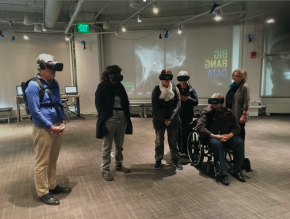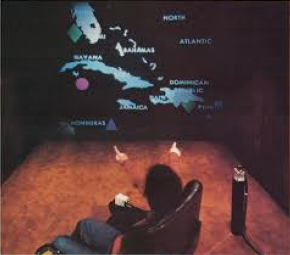

XR, or extended reality, includes VR + AR as well as technologies + techniques in the reality-virtuality continuum that are both commercially available and yet-to-be-developed. ODL ‘hacks’ XR, interrogating its assumptions; recovering its histories; pushing the boundaries of existing hardware; and inventing new uses and user-scenarios. Behind this and the Lab’s other work are larger questions about the world: how can media help us to see it more clearly and critically? and how can we enable others to create and share their visions in an equitable manner? To answer these questions, we’ve joined forces with artists and technologists, with documentarians and journalists, with festivals and funders, and with interested communities, students, and scholars.
How can VR and AR be used to enhance the documentary project? Can we use augmentation as a way to redefine public space and challenge the narratives of the past? What should we make of claims for empathy and enhanced realism – hope, hype, or humbug? And how to reconcile our inherited ideas of story in settings where users are free to navigate their own course of action?
ODL has launched a five-year R&D program in collaboration with the International Documentary Festival Amsterdam’s DocLab, where we work with artists, audiences, and curators to tackle these and other questions on a global level. We also explore quite specific research questions with artists’ collectives and ODL Fellows, with sister research groups at MIT, with our students.
In the spirit of MIT’s commitment to mens et manus, mind and hand, we are deeply interested in learning by doing. Documentary makers, tool-designers, and producers regularly visit the lab, some holding development workshops and others incubating their projects during their stays as ODL Fellows. Our students and colleagues create work as a form of practice-based research, hacking emergent technologies and exploring their capacities for representation, story, and expressivity. The results of the Lab’s creative research can be found at the Venice Biennale, Ars Electronica, and museums like Boston’s ICA.
Knowledge transfer and a deep understanding of new technologies take many forms. The seminar room is a locus classicus, and the Hacking XR course (CMS.339) is MIT’s first regularly offered course on VR, AR, and emerging immersive technologies. A hands-on course, it involves creative production as well as critical analysis, drawing on both traditions to hack assumptions and discover unexpected affordances. The course includes regular meetings with artists, technologists, curators, and critics. You can follow the HackingXR Speaker Series here.
ODL’s weekly lecture series regularly includes people who are defining the field’s future, whether technologically, artistically, critically, or in terms of community access. International conferences such as Virtually There enable the Lab to stake-out key developments for research and development. And lectures and publications by members of the ODL team allow us to extend this work to global venues. Where possible, we record this material and make it available on our website.




Generations of unnamed artists created an immersive environment activated by flickering torch light, in the caves we today know as Lascaux.
While at MIT’s Lincoln lab and at Harvard, Ivan Sutherland develops what is considered the first augmented reality head-mounted display
The Media Lab’s Andy Lippman, Michael Naimark, and Ricky Leacock create Aspen Movie Map, a revolutionary 3D, hypermedia, interactive tour of Aspen.
The Architecture Machine Group’s Richard Bolt and Chris Schmandt design a voice and gesture system called Put That There, an intuitive interface to complex computer interaction.
During his residency at the Open Documentary Lab, Karim Ben Khelifa reimagines his photographic portraits of battlefield enemies as an award-winning responsive Virtual Reality experience: The Enemy.
The Open Doc Lab’s convening Virtually There, co-curated by Deniz Tortum and Sarah Wolozin, draws together leading international makers and thinkers to explore what happens when documentary meets Virtual Reality and includes a 2-day exhibition of pioneering VR works.
MIT’s first regularly offered course on XR – Hacking VR: VR and Immersive Media Production CMS.339 – is offered by Comparative Media Studies and taught by William Uricchio and Sandra Rodriguez.
ODL Fellow Assia Boundaoui launches her Inverse Surveillance project in conjunction with the screening of her film, The Feeling of Being Watched at the Tribeca Film Festival.
Manic, produced by ODL Fellow and XR lecturer Sandra Rodriguez, wins Ars Electronica’s first-ever Golden Nica for Virtual Reality.
Rashin Fahandej, ODL Fellow and Emerson College assistant professor, wins the James and Audrey Foster Prize for her multi-platform XR installation A Father’s Lullaby.
Porton Down, produced by ODL Fellow Callum Cooper, premieres at the Venice Film Festival.
ODL launches a two-year initiative to explore augmentation techniques and technologies in public spaces.
Chomsky vs Chomsky, directed by Sandra Rodriguez in collaboration with fellow Cindy Bishop, is incubated at ODL and presented at Sundance 2020.
Volumetric video excerpt from “Chronicles of a Fall” by ODL Fellow Nadav Assor (Co-Producer, Co-Director), Tirtza Even (Co-Producer, Co-Director), Stefan Oliveira-Pita (Editor).
Video still from “Sanctuaries of Silence“, spotlighted in Immerse, a publication about emerging nonfiction storytelling and MIT Open Doc Lab initiative.
Photo of Hacking XR Lecturer Sandra Rodriguez, HackingVR 2016, by ODL Researcher ’17 Sue Ding.
Website by ODL Designer, Melissa Q. Teng.